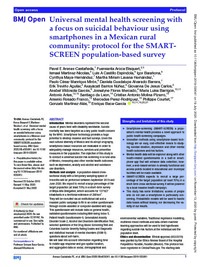Universal mental health screening with a focus on suicidal behaviour using smartphones in a mexican rural community: protocol for the smartscreen population-based survey
Autor
Arenas-Castañeda, Pavel E.
Aroca Bisquert, Fuensanta
Martinez-Nicolas, Ismael
Castillo Espíndola, Luis A.
Barahona, Igor
Maya-Hernández, Cynthya
Lavana Hernández, Martha Miriam
Manrique Mirón, Paulo C.
Alvarado Barrera, Daniela G.
Treviño Aguilar, Erik
Barrios Núñez, Axayácatl
De Jesus Carlos, Giovanna
Vildosola Garcés, Anabel
Flores Mercado, Josselyne
Barrigón-Estévez, María L.
Artes, Antonio
de León, Santiago
Molina-Pizarro, Cristian A.
Rosado Franco, Arsenio
Perez-Rodriguez, Mercedes
Courtet, Philippe
Martínez-Alés, Gonzalo
Baca-Garcia, Enrique
Fecha
2020Resumen
Introduction: Mental disorders represent the second cause of years lived with disability worldwide. Suicide mortality has been targeted as a key public health concern by the WHO. Smartphone technology provides a huge potential to develop massive and fast surveys. Given the vast cultural diversity of Mexico and its abrupt orography, smartphone-based resources are invaluable in order to adequately manage resources, services and preventive measures in the population. The objective of this study is to conduct a universal suicide risk screening in a rural area of Mexico, measuring also other mental health outcomes such as depression, anxiety and alcohol and substance use disorders.
Methods and analysis: A population-based cross-sectional study with a temporary sampling space of 9 months will be performed between September 2019 and June 2020. We expect to recruit a large percentage of the target population (at least 70%) in a short-term survey of Milpa Alta Delegation, which accounts for 137 927 inhabitants in a territorial extension of 288 km2.
They will be recruited via an institutional call and a massive public campaign to fill in an online questionnaire through mobile-assisted or computer-assisted web app. This questionnaire will include data on general health, validated questionnaires including Well-being Index 5, Patient Health Questionnaire-9, Generalized Anxiety Disorder Scale 2, Alcohol Use Disorders Identification Test, selected questions of the Drug Abuse Screening Test and Columbia-Suicide Severity Rating Scales and Diagnostic and statistical manual of mental disorders (DSM-5) questions about self-harm.
We will take into account information regarding time to mobile app response and geo-spatial location, and aggregated data on social, demographical and environmental variables. Traditional regression modelling, multilevel mixed methods and data-driven machine learning approaches will be used to test hypotheses regarding suicide risk factors at the individual and the population level.
Ethics and dissemination: Ethical approval (002/2019) was granted by the Ethics Review Board of the Hospital Psiquiátrico Yucatán, Yucatán (Mexico). This protocol has been registered in ClinicalTrials.gov. The starting date of the study is 3 September 2019. Results will serve for the planning and healthcare of groups with greater mental health needs and will be disseminated via publications in peer-reviewed journal and presented at relevant mental health conferences.
Fuente
BMJ Open, 10(7), e035041Identificador DOI
doi.org/10.1136/bmjopen-2019-035041Colecciones
La publicación tiene asociados los siguientes ficheros de licencia:


